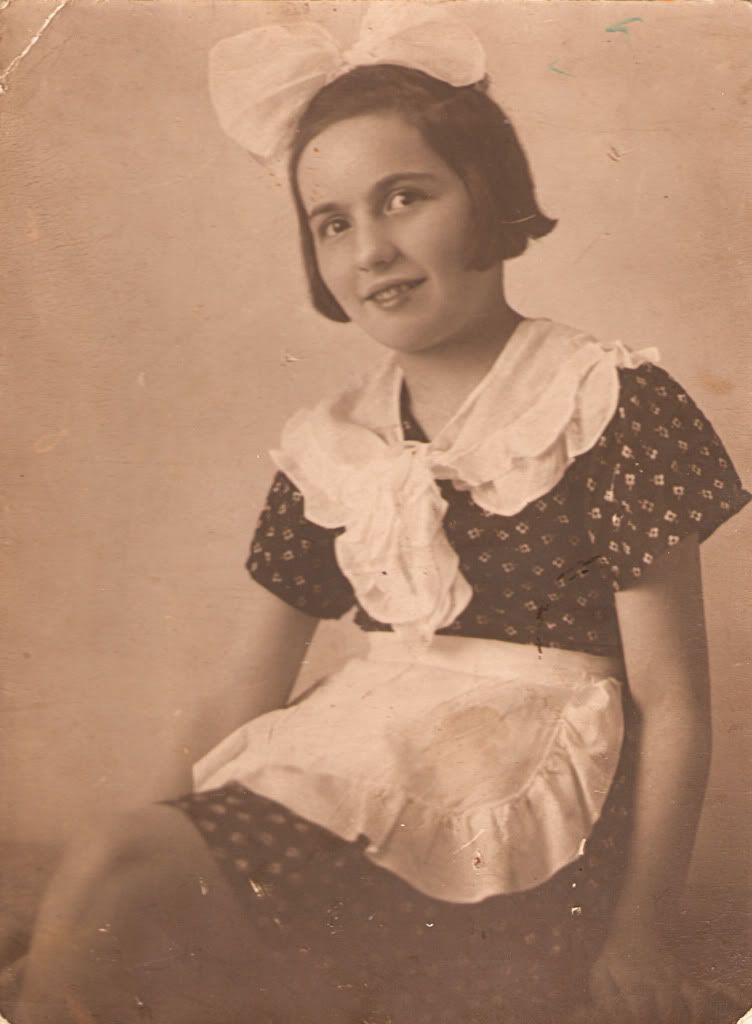
My mother as a young girl. No date. Transylvania. C. 1936 at a guess.
I have long meant to return to the subject of my mother in the kitchen and the question of domain. I am saving the actual photograph to the end.
This is what I wrote on 22 November, beginning with some definitions of domain:
▸ noun: a knowledge domain that you are interested in or are communicating about ("It was a limited domain of discourse")
▸ noun: territory over which rule or control is exercised ("His domain extended into Europe")
▸ noun: the set of values of the independent variable for which a function is defined
▸ noun: people in general; especially a distinctive group of people with some shared interest
▸ noun: a particular environment or walk of life
It's the second definition I am interested in, the territory over which rule and control is exercised. What are rule and control? They are what we seem to need in order to keep the threatening and ravenous at bay. How are they exercised? How are they asserted, wrested, defended?
I talked a little about her restricted domain as a girl, following her bout of rheumatic fever:
But somewhere here there once existed a much reduced domain. A place by the window: skaters outside shouting and waving back.
That domain, that rule and control we all crave, a sphere in which our will matters, is the subject. It is often imagined that the traditional male domain was greater than the female. I am not sure this was the general case. When I think of the lives of most boys in most times, it was school, followed by work and a brief period of limited licence, then marriage and responsibility for ever and ever till death. There was no career. Perhaps I should repeat that: there was no career. There was a job that meant everything and which offered relatively little opportunity for initiative or control. The factory was not your domain if you worked on the factory floor, as one of my grandfathers did. Nor was the office, if there were superiors overseeing you. It was not impossible to advance there but the fact is that, by definition, the overwhelming majority did not advance. The job, at the same time, was, in essence, your certificate of masculinity. If you lost it, you were emasculated and became an object of pity and/or contempt. The same happened once you retired. You got under feet. Many shuffled off pretty soon after retirement.
Even if there was some improvement in your position at work it would still be subject to the approval of others above you. You had to channel your energies very hard to progress. You had to retain your vigour, inventiveness and optimism. Anything else and you'd go under, like the thirty-bob-a-week clerk in John Davidson's poem.
The home was distinctly not your domain. The home was generally the wife's. If you were lucky enough to have a shed or an allotment, or even, God granting it, a den, that was your playground. In the family you were brought in as a threat. 'Wait till your father comes home!' I don't think being a so-called patriarch was all beer-and-skittles. Once the long day was finished, often just one day a week for most, there might be both, together with some comradeship. Otherwise it was frustration, powerlessness, and in some cases drunkenness and violence. Most men got their wage packet and, if properly socialised, handed it over to the wife for housekeeping, with some pocket money for amusement (drinking or displacement activity) handed back.
This is the class of men that generally gets it in the neck as being vulgar, crude, worthless. Today the boys are taught their uselessness or made to feel it before they even get out there and work. The alternative is fantasy and a kind of despairing loutishness, an eternal defraying of the cost of responsibility. Because what does responsibility ever bring you? Answer: see above.
At least in the house, possibly (with luck) in the bedroom and above all in the kitchen there was a female domain. To be sure it was absolutely hung about with work and responsibility. But no-one told you what to do in your own kitchen. You had to manage it yourself. It was restricted as hell, and, unlike with the male so-called domain, there was no hope of advancement, to even the next level of motherhood or matriarchy. It was a trap full of children. You had authority over them, but, like the young women in Larkin's poem, they were pushing you to the side of your own life. And that was something you had to accept, lovingly or unlovingly. The steps were, proverbially, scrubbed bright. The nest was yours to make though it cost you in effort and upkeep. Dusk is a great time for voyeurs. Walking past lit rooms with their curtains still open you cannot help but notice how feminine most environments are. The house domain remains feminine even now.
Domains, or what you can make into domains, are very precious. Our domains are chiefly in our heads and our imaginations. Our entire habit of buying things on credit is an extension of domain in a world where we seem to have ever less power, or at least where we are so much more keenly aware of powers beyond ourselves. The bread must still be earned. The circuses have grown to phantasmal size.
But it is my own mother's domain: that house and that kitchen that is my concern. It is the way we were brought up to move and act in it that I want to explore. And will carry on doing.

No comments:
Post a Comment